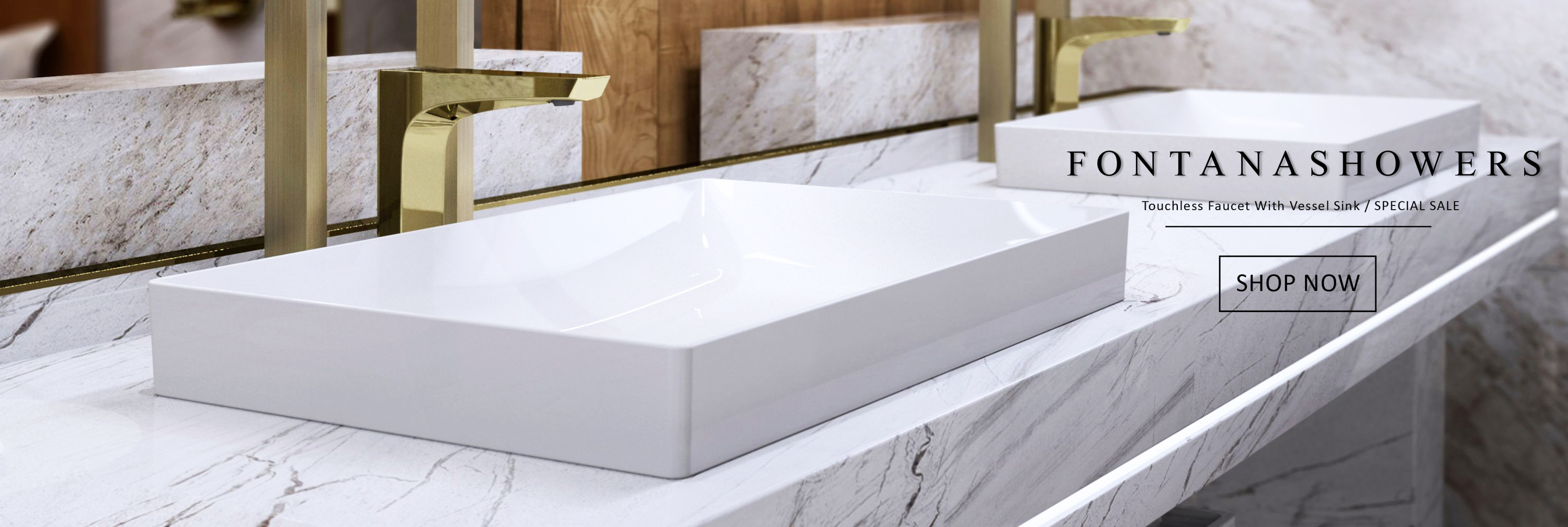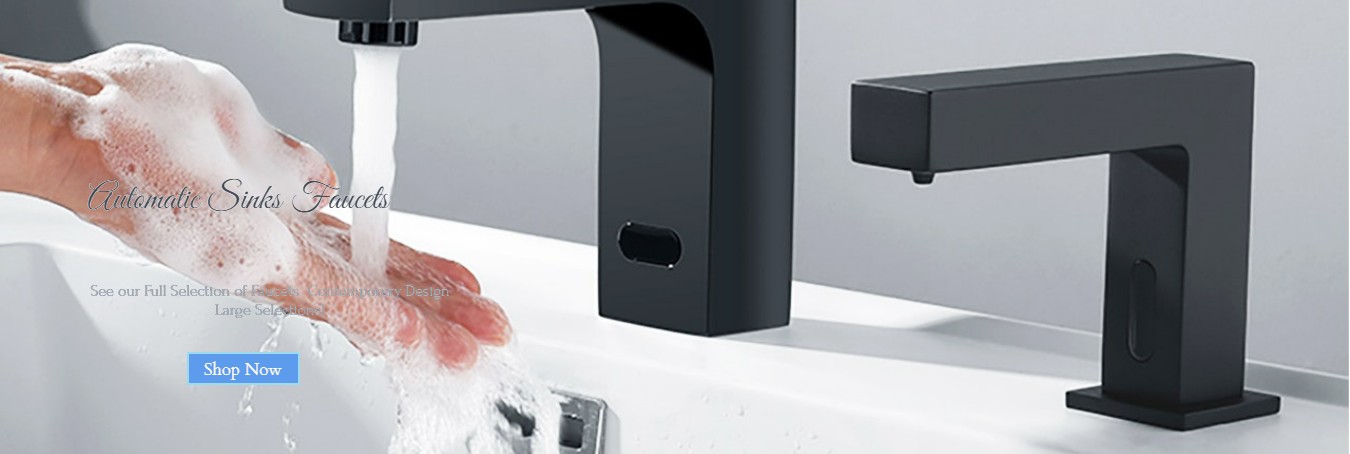We are leading supplier of touchless faucets and automatic soap dispensers
FontanaShowers® the Motion Sensor Touchless Faucets & Touchless Soap
Dispensers for commercial applications. Our commercial touchless Faucets are designed to work flawlessly in public bathroom applications. We are a leading supplier in
the industry.
Fontana commercial sensor faucets come in both contemporary and classic designs. For any questions, feel free to speak with our commercial consultants call our Sales
Hotline
800-684-4489
FontanaShowers® maintains high levels of efficiency, quality control, customer responsiveness, and speed. We have realized that the challenging requirement is to innovate successfully, not only in product development but also in production, so we continue
to set the industry standard in product innovation and craftsmanship.
Contact Commercial Customer Service
800-684-4489
Our Clients
Valued
We collaborate with the following prestigious clients.
Contact Address:
Fontana Showers® LLC
4270-I Henninger Ct.
Chantilly, Virginia 20151
703-378-2808
Corporate Contact Info
To reach Fontana Showers on a corporate level,
you can send us email[email protected]
Read More
We Play Pivotal Role in the Touchless Faucet Industry
Touchless bathroom faucets and soap dispensers are fitted in commercial or public restrooms for reasons such as hygiene, convenience, and efficiency.
Fontana Sensor Faucets aid in choosing the best touchless bathroom fixtures for commercial or public restroom applications while highlighting
the most important aspect of their installation: to ensure very good hygiene, convenience, and efficiency.

A very important aspect of this is the faucet touchless sensor technology. Its sensing capability makes users yearn for a fixture that
features infrared sensors, sensing enough movement without being overly responsive. Quality and durability are important factors,
and thus, Fontana Sensor Faucets urges that the fixtures be made from durable materials
such as stainless steel and chrome to withstand the real beating of commercial restrooms.

Water conservation is another focus area, as it is considered touchless faucets with sensors regulating water flows for anti-wastage.
Other factors to consider for automatic bath faucets are the power source diversity, ease of installation and maintenance, evaluation
of the dispenser capacity, hygiene factor features such as antimicrobial coatings, incorporation
into other restroom systems and brand reputation or reviews.

Finally, it complies with regulations related to the ADA, emphasizing that all designs must adhere to local standards to enhance accessibility.
This review of these factors aims to empower users and enable proper choices when it comes to selecting a commercial touchless bathroom faucet. f touchless bathroom
fixtures for commercial or public restrooms to achieve increased cleanliness, efficiency, and user satisfaction.
Here are some key considerations and Best Factors
When Selecting Fontana Touchless Faucets:
Our touchless fixtures have reliable sensor technology. Infrared sensors are commonly used in touchless dispensers, ensuring that the sensors are sensitive enough to detect motion accurately
without being overly sensitive.
Fontana automatic bathroom faucets are made from durable and high-quality materials, as commercial restrooms experience
heavy usage. Stainless steel and chrome finishes are common choices due to their durability and
resistance to corrosion
Fontana touchless faucets have water-saving features, as many of our modern touchless faucets come with sensors that control water flow, reduce waste, and promote water conservation.
Check the power source for touchless fixtures. Some operate on batteries, while others are hardwired. Consider the
availability of power sources in your restroom and choose accordingly.
Select fixtures that are easy to install and maintain. Look for touchless systems with user-friendly interfaces for
adjustments and troubleshooting. Additionally, choose fixtures with easy-to-replace components to simplify
maintenance.
Evaluate the capacity of touchless dispensers, especially in high-traffic areas. Larger capacity dispensers may
require less frequent refilling.
Look for additional hygiene features, such as antimicrobial coatings or materials that inhibit the growth of
bacteria. This is particularly important in public spaces where maintaining a high level of cleanliness is
crucial.
Consider fixtures that can integrate with other restroom systems, such as automated hand dryers or flushometers. This integration can provide a more seamless and efficient restroom
Ensure that the selected touchless fixtures comply with local regulations and accessibility standards. Compliance may
involve factors such as ADA (Americans with Disabilities Act) requirements. By considering these factors, you can
select touchless bathroom fixtures that meet the specific needs of commercial or public restrooms, promoting
cleanliness, efficiency, and user satisfaction.
|
|
Browse Featured Selections
Best Touchless Faucets
Ask an Expert!
Innovative
Get Answers
Generally, touchless are more expensive than standard faucets.
This arises from a few key factors:
Advanced technology; wherein this faucet type includes sophisticated technology—infrared or ultrasonic sensors detect hand movement to trigger the water flow. Such technology requires very fine engineering and integration, hence increasing the cost of production. Ultrasonic sensors are more accurate; hence, they will also be more expensive than infrared sensors

Read More
Quality Material; Most touchless faucets are fabricated from quality materials like brass or stainless steel, so most of them have added durability and reliability features. These are costlier compared to those used in faucet construction, thereby increasing their price. Luxurious finishes—such as polished chrome, brushed nickel, and oil-rubbed bronze—add to the price
.jpg)
Complex Engineering; Touchless faucets are more complicated in design and engineering. This is because they have sensors, solenoid valves, and a power source—a battery or an AC adapter—to enable the water to pass without being manually actuated. Aside from making them more costly to manufacture, this added complexity might also make them harder to install, sometimes requiring professional installation (Plumbing Lab) (Fixtures Academy)
Research and Development: Innovation in touchless faucet technology requires huge investments in research and development. It is in this regard that companies invest largely in R&D to improve the accuracy of the sensors, bring down response time, and enhance the overall user experience, all of which can be factored into the higher prices. Mass R&D investment is required in the innovation of faucets' touchless technologies, and this is a requirement that justifies the price premium at which this high-tech fixture is usually sold.

Read More
Making considerable investments in this aspect, companies assign considerable resources to improving the sensor accuracy and reliability standards that form the basis of a touchless faucet, usually through extensive testing and improvements of the infrared and capacitive sensors that help determine hand movements. It is for this reason that it becomes a complex challenge to ensure that these sensors can function accurately under different lighting conditions and in other different environments. Consequently, the development process tends to be lengthy and expensive, with the final cost directly including the price of the end product.
Reducing response time is also another important aspect of R&D in touchless faucet technology. These should create the effect of an instant response to hand movement, a natural and efficient user experience. The technology requires very sophisticated programming and fitting with the most recent microprocessors that can read the output from sensors in almost no time.

Such high levels of responsiveness to demands from users are important to ensure user satisfaction, but at the same time, they require constant innovation and testing, pushing R&D costs further.
Improvement of the overall user experience is another area of much investment apart from sensor accuracy and response time. Such companies are now developing products which could be fine-tuned for temperature and water flow in an endeavor to make touchless faucets more user-friendly overall. Such functional innovations generally require new software to be developed along with new user interfaces, and also involve heavy testing on the usability parameters so that devices are as per the customer's expectation.

It's an all-round approach that involves the commitment of sizeable monetary and human resources to perfect most - if not all - the aspects associated with faucet functionality.
In the end, the touchless faucet companies spend a great deal on R&D that translates into a high premium for the products. The approach to highlighting sensor accuracy, response time, and user experience will make the manufacturer's offerings in line with and above expectations. While innovations raise costs, they also push the market forward and set new benchmarks against which the world measures. This continued R&D investment reflects a serious concern about improvement and innovativeness as the only way to remain ahead in a fast-changing touchless technology environment.

Power Source: Touchless faucets require either batteries or an electrical hookup to drive the underlying sensor(s) and control mechanism. Additional components and design considerations for housing and managing the power supply add to the overall cost (Plumbing Lab) (Family Handyman).

Additional Features: A lot of touchless faucets have adjustable water temperature and flow settings, voice activation, and LED indicators, among others. These additional features call for more advanced technology and materials, which raises the cost further. Vaughn, 2018 Family Handyman.

Market Positioning: Touchless faucets are generally positioned as premium products due to convenience and hygiene benefits, plus a modern aesthetic. This positioning gives them the ability to charge higher prices while maintaining customers who would pay a little more for advanced features and better quality.

While touchless faucets come at a pricier price, this is offset by advanced technology, higher-quality materials, complex engineering, additional features,
and large R&D investments. Meanwhile, consumers find the benefits in terms of convenience, hygiene, and water
savings quite worth the investment.

For deeper learning on the issue,
explore these resources, among others:
Family Handyman
Architectural Digest
Consumer Reports
Artistic Elements ...
Auto
Explore Finish List
|
|
|